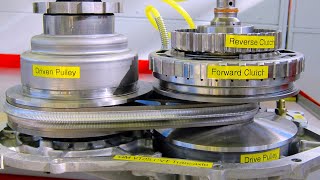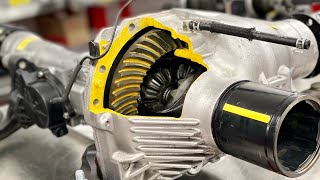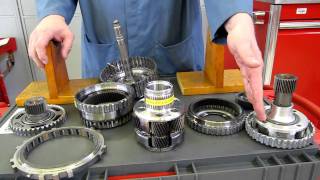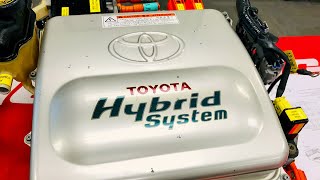Sunday, 11 January, 2026г.
















Где искать: по сайтам Запорожской области, статьи, видео ролики
пример: покупка автомобиля в Запорожье
Continuously Variable Transaxle (CVT) Operation
See the parts of a CVT in operation:
Drive pulley at 0:15
Driven Pulley at 0:20
Steel push belt at 0:23
Input shaft at 0:30
Reverse clutch at 0:40
Forward clutch at 0:48
Output shaft at 1:03
CVT operational theory at 1:20
Low gear ratio (pulley ratio) at 1:30
High gear ratio (pulley ratio) at 1:55
MUST SEE! CVT Operational demonstration at 2:45
Underdrive ratio (2.6:1) demonstration at 2:48
Overdrive ratio (0.4:1) demonstration at 3:00
Variable ratio and direct drive discussion at 4:15
eCVT difference at 4:50
Weber State University (WSU) - Automotive Technology Department - Transmission Lab. GM Continuously Variable Transaxle (CVT) model VT25. How a belt-driven CVT Works.
Ford, GM, Honda, Chrysler (JATCO), and Nissan CVTs are similar. CVTs allow the engine to operate at the RPM for peak efficiency while increasing and decreasing the transmission drive ratio to change vehicle speed.
This video helps satisfy 2017 NATEF MAST Task A2.C.4. "Describe the operational characteristics of a continuously variable transmission (CVT)", a priority 3 task.
eCVTs are different and are demonstrated in another WeberAuto video.
Download the VT25 Range Reference Chart here: http://www.weber.edu/wsuimages/automotive/ASEP/VT25%20Range%20Reference%20Chart.pdf
http://www.weber.edu/automotive
This video was created and edited by John D. Kelly at WSU. For a full biography, see http://www.weber.edu/automotive/J_Kelly.html
Visit my other youtube channel https://www.youtube.com/user/vibratesoftware to see the amazing NVH app for vibration diagnosis! Donate to the Department of Automotive Technology at Weber state University here: http://advancement.weber.edu/givetowsu
Теги:
NACAT STEM Guy in wheelchair Ford Motor Company (Automobile Company) Ford Saturn Honda Motor Company Ltd (Organization Founder) Toyota CAT Professor WSU CAP CVT Transmission (Invention) MLR CCAR ASE How a CVT works CVT Explained Aisin Chrysler Pulley NATEF ASEP AAMCO Automobile (TV Genre) General Motors (Business Operation) Weber State University (College/University) Continuously Variable Transmission (Transmission) Belt Nissan Cars T-TEN
Похожие видео
Мой аккаунт


 У вашего броузера проблема в совместимости с HTML5
У вашего броузера проблема в совместимости с HTML5


